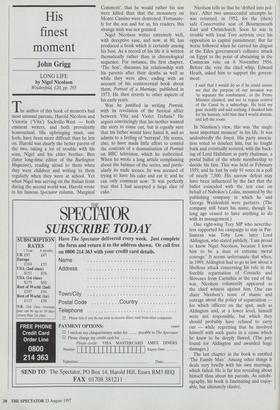His finest moment
John Grigg
LONG LIFE by Nigel Nicolson Weidenfeld, £20, pp. 295 The author of this book of memoirs had most unusual parents, Harold Nicolson and Victoria (Nita') Sackville-West — both eminent writers, and both prevalently homosexual. His upbringing must, one feels, have been more difficult than he lets on. Harold was clearly the better parent of the two, taking a lot of trouble with his sons, Nigel and his elder brother, Ben (later long-time editor of the Burlington Magazine), reading aloud to them when they were children and writing to them regularly when they were at school. Yet when Nigel was serving on the Italian front during the second world war, Harold wrote in his famous Spectator column, 'Marginal Comment', that he would rather his son were killed than that the monastery on Monte Cassino were destroyed. Fortunate- ly for the son and for us, his readers, this strange wish was not granted.
Nigel Nicolson writes extremely well, with deceptive ease, and now, at 80, has produced a book which is certainly among his best. As a record of his life it is written thematically rather than in chronological sequence. For instance, the first chapter, `The Son', discusses his relationship with his parents after their deaths as well as while they were alive, ending with an account of his controversial book about them, Portrait of a Marriage, published in 1973. He then reverts to other aspects of his early years.
Was he justified in writing Portrait, with its revelation of the farcical affair between Vita and Violet Trefusis? He argues convincingly that his mother wanted the story to come out, but is equally sure that his father would have hated it, and so admits to a feeling of 'betrayal'. He seems, also, to have made little effort to control the contents of a dramatisation of Portrait on BBC television, which he authorised. When he wrote a long article complaining about the balance of the series, and partic- ularly its nude scenes, he was accused of trying to have his cake and eat it; and he can only comment now: 'It was perfectly true that I had accepted a large slice of cake.' Nicolson tells us that he 'drifted into pol- itics'. After two unsuccessful attempts he was returned, in 1952, for the (then) safe Conservative seat of Bournemouth East and Christchurch. Soon he was in trouble with local Tory activists over his opposition to capital punishment. But far worse followed when he carried his disgust at the Eden government's collusive attack on Egypt to the point of abstaining in the Commons vote on 8 November 1956. Before the vote the chief whip, Edward Heath, asked him to support the govern- ment: I said that I would do so if he could assure me that the purpose of our invasion was `to separate the combatants', as the Prime Minister claimed, and not to regain control of the Canal by a subterfuge. He held my gaze steadily and said nothing. I thanked him for his honesty, told him that I would abstain, and left the room.
In Nicolson's view, this was 'the single most important moment' in his life. It was undoubtedly the finest. His party associa- tion voted to deselect him, but he fought back and eventually secured, with the back- ing of Lord Hailsham as party chairman, a postal ballot of the whole membership to decide his fate. This was held in February 1959, and he lost by only 91 votes in a poll of nearly 7,500. His narrow defeat may have been influenced by the fact that the ballot coincided with the test case on behalf of Nabokov's Lolita, mounted by the publishing company in which he and George Weidenfeld were partners. (The company still bears his name, though he long ago ceased to have anything to do with its management.) One right-wing Tory MP who neverthe- less supported his campaign to stay in Par- liament was Toby Low, later Lord Aldington, who stated publicly, 'I am proud to know Nigel Nicolson, because I know him to be a man of extreme moral courage.' It seems unfortunate that when, in 1989, Aldington had to go to law about a libellous attack concerning his role in the forcible repatriation of Cossacks and Slovenes from Carinthia at the end of the war, Nicolson voluntarily appeared as the chief witness against him. One can share Nicolson's sense of shame and outrage about the policy of repatriation for which officers on the spot, such as Aldington and, at a lower level, himself were not responsible, but which they should probably have refused to carry out — while regretting that he involved himself with such gusto in a cause which he knew to be deeply flawed. (The jury found for Aldington and awarded huge damages.) The last chapter in the book is entitled `The Family Man'. Among other things it deals very briefly with his own marriage, which failed. He is far less revealing about himself than about his parents. As autobi- ography, his book is fascinating and enjoy- able, but ultimately elusive.


























































 Previous page
Previous page